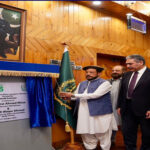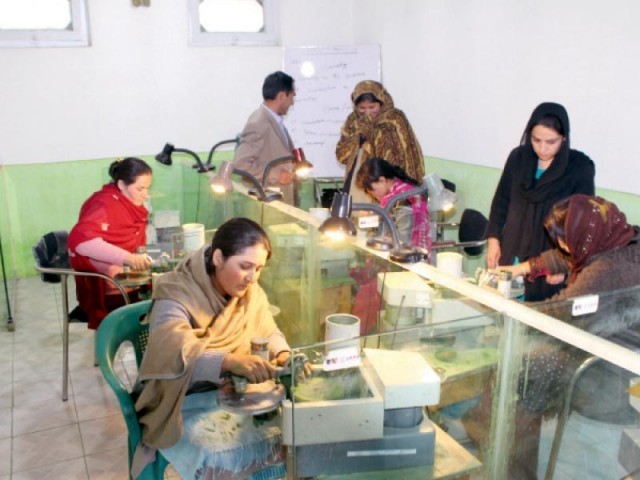HUNZA:The last seven years have been life-changing for Meher Parwar, a resident of Gilgit-Baltistan’s (G-B) scenic Hunza Valley. From being dependent on men in a patriarchal society, she has become a skilled trainer who imparts vocational training to other women. The 30-year-old master trains, and so helps empower, the region’s women at a gemstone cutting and polishing centre in Hunza.
HunzaNews,shabbir-mir: April 5th, 2014.
The venture is one of two well-equipped centres established under a USAID-funded programme titled ‘Technology Transfer and Skill Development in Gems Sector’. The project is being executed in Hunza and Chitral by Rupani Foundation, an NGO working to alleviate poverty by enhancing marketable skills of women.
A girl’s best friend
G-B is rich in rubies, emeralds, sapphires and topaz, to name a few. According to experts, more than 60 types of precious and semi-precious stones are found in the region.
“I got interested in gemstones nearly seven years ago,” said Parwar, who completed a four-month extensive training course on gemstone cutting and polishing in 2013 under the supervision of a Sri Lankan expert in Hunza. Nine other women also completed the master trainers course, which enables them to further train a workforce of around 100 people in the science of gemstone cutting and polishing.
“This is not just a mere training course; it is much more. It gives one a feeling of inner satisfaction,” said one recently trained woman.
“Helping out so many families by passing on skills we learn is a great feeling,” she added. After becoming a master trainer, she earns a salary of Rs20,000 per month.
Under her supervision, at least 50 individuals are currently undergoing a three-month training programme at the centre in Hunza. Of them, 45 are learning modern techniques to convert raw material into a finished product, something which will enable them to earn a decent living in the long run.
Blinging local economy
“This initiative can significantly change the lives of people who reside in the mountainous region. They live in extreme poverty, especially women,” shared Jalaluddin Hunzai, the chief executive officer of Rupani Foundation. “In absence of technical knowledge, institutional support, reliable data of deposits, and a proper legal framework, the potential of this sector is far from its best.”
However, Hunzai added, the project will increase margin for workers at all levels of the value chain and produce high-quality products for the end clientele. It is said more than 8,000 locals are involved in small-scale mining and nearly 70% of all gems in Pakistan are sourced from G-B, making stone finishing skills an invaluable asset.
At present, middlemen sell these precious stones raw, mostly in markets in Peshawar. From there, the stones are exported to India, Sri Lanka, Thailand and Europe. At times, the same stones are imported back to Pakistan after value additions, resulting in a trade deficit.
Amin Jan, a project manager at the centre, is hopeful of a positive outcome from the training programme. “People have been unable to benefit locally from treasures found in their backyard because earlier they lacked the skill. But now we hope to overcome this impediment,” shared Jan. With value additions like skilled stone cutting and polishing, and a more open and competitive marketing mechanism, the gem sector has unlimited potential for economic transformation of the area.
Published in The Express Tribune
























